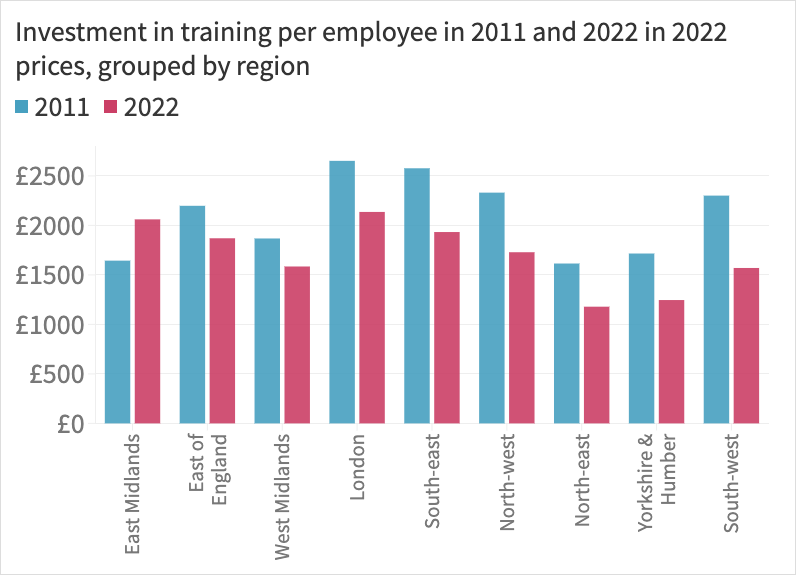The Decline in Behavioural Training Budgets: How UK Firms Can Adapt
In the UK, businesses are making a costly decision by cutting back on employee training, including crucial behavioural training. Data from the New Economic Foundation (NEF), published on 19 March 2024, reveals a significant reduction in training budgets, with overall spending down by nearly 20% over the last decade. The public sector and large companies have been hit hardest, with cuts exceeding 30%. As highlighted by New Economics Foundation, this shift in priorities isn’t just about financial figures—it’s directly impacting the quality of training employees receive, including essential behavioural training. In an increasingly competitive and fast-evolving business landscape, such reductions leave organisations vulnerable, unable to equip their teams with the skills necessary to adapt to change and secure long-term success.
This bar chart, sourced from the New Economics Foundation, illustrates the shifts observed between 2011 and 2022. The figures have been inflation-adjusted and are presented on a per-employee basis.
The underinvestment in skills by labor force members is not easily corrected and has broad and serious consequences. This is not just about lower productivity or job mobility being cut short; it has implications for whether the UK can compete effectively as part of the fast greening of world economies. As the UK moves towards its 2050 goal of net zero emissions, a dearth of much-needed skills is proving dangerous in areas like energy efficiency and renewable energy supply. Alex Chapman, a senior researcher at NEF, points out the problem:
“At present, the system we have discourages employers from giving their workers training or people who are reaching middle age from retraining afterwards. This is bad for productivity and cuts down opportunities for advancement for everyone.”
The facts are clear. Without adequate investment in training, the UK risks sinking further not only as a company but in providing for its future needs at home.
This is not just a commercial issue; it has serious implications for the nation and the welfare it provides its people.
The Missing Link in UK Workforce Development: Behavioural Training
In today’s fast-paced business world, behavioural training is the missing link that many companies overlook. Sure, technical skills are important, but they’re not the whole story. What really sets high-performing teams apart are the behavioural skills—things like communication, leadership, and adaptability. These aren’t just nice-to-haves; they’re the foundation of success. When your employees have the right mindset and behaviours, they don’t just do their jobs—they excel, collaborate seamlessly, and adapt to whatever challenges come their way.
Behavioural training not only improves communication and adaptability but also equips employees with the tools to navigate complex challenges in the workplace. (Photo courtesy of Freepik)
As companies strive for success in this rapidly evolving landscape, it’s clear that behavioural skills are no longer optional—they are essential. These skills provide the foundation for collaboration, adaptability, and leadership in the workplace. But there’s an even deeper shift taking place that many organisations are failing to fully embrace. According to 2021 research by the consulting firm McKinsey, the pandemic prompted a noticeable transformation in how businesses approach employee development. In fact, more than half of the companies surveyed increased the number of leadership, critical thinking, and decision-making skills courses they offered. This shift highlights the growing recognition that in today’s business world, soft skills are crucial in navigating complexity and driving long-term success.
It’s no longer just about filling a knowledge gap; it’s about empowering teams with the mindset and behaviours needed to thrive in an uncertain future.
The Future of Behavioural Training: Trends and Innovations
At Sidestream, we’ve always been at the forefront of this shift. Our award-winning event, The Death of Jane Doe, is a prime example of how immersive learning can create a profound, lasting impact. In collaboration with the renowned theatre company Diatribe, we’ve delivered large-scale, award-winning events for public engagement that captivate audiences in unique and unforgettable ways. These events are not your typical training experiences. Designed for up to 300 participants, they feature high-calibre talent, live music, and production values on par with a West End show—ensuring that the experience is both memorable and transformative.
Our immersive simulation training goes beyond passive observation—they thrust participants into high-stakes scenarios where every decision has real consequences. By combining live performance, interactive storytelling, and psychological research, these events not only challenge assumptions but also uncover hidden biases. Participants don’t just watch; they live the story, becoming part of it. This deep level of engagement ensures that the lessons learned during these events are absorbed at a visceral level, leaving participants with lasting insights that influence how they think and act long after the event concludes.
Explore how we can work together to create meaningful, engaging experiences that drive results. Reach out to us today and discover the future of training.


